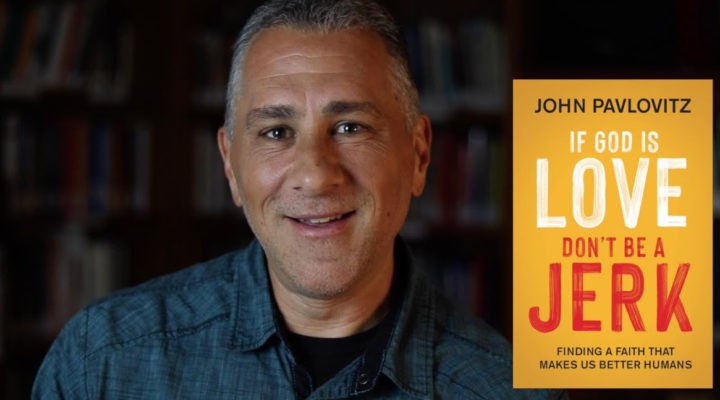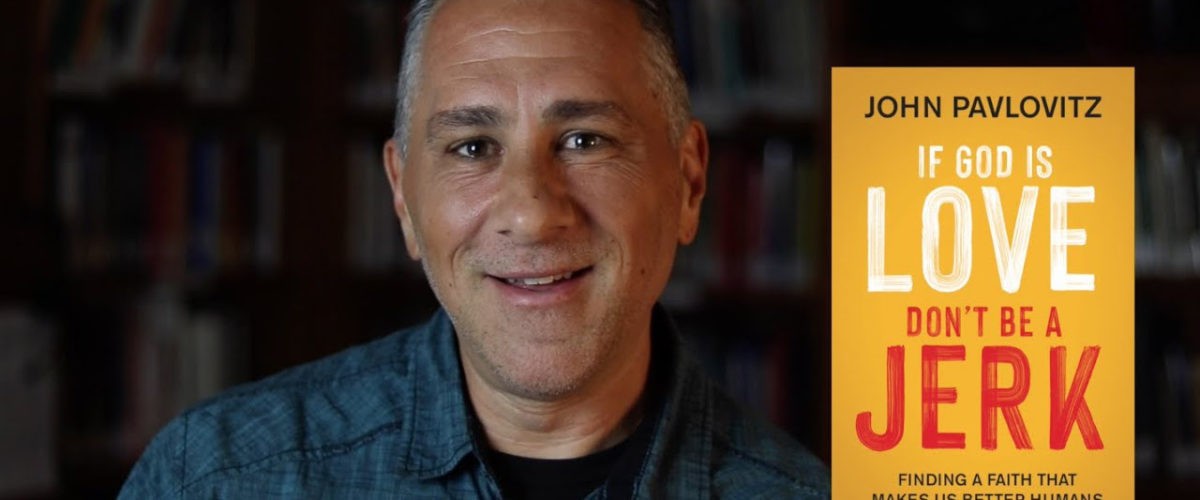American Christianity must provide safe spaces for theological and social reflection if the nation’s growing population of “nones” and disenfranchised believers are to be engaged and served meaningfully by the church, author and blogger John Pavlovitz said during a Nov. 16 webinar hosted by Baptist News Global.
An openness to dialogue is also critical to promote LGBTQ inclusion and to counter the white supremacy, racism and Trumpism embraced by conservative evangelicals and which is mistaken as true Christianity in popular culture, said Pavlovitz, writer of the Stuff That Needs To Be Said blog and author of five books including his latest, If God is Love Don’t Be a Jerk, which was released in September.
“The church should be the place where we can have the most authentic conversations that we could ever have and where we can be the most authentic versions of ourselves” and where “there is an alternative expression of Christianity that is not predatory and exclusionary and angry,” he said during the livestreamed conversation with BNG Executive Director Mark Wingfield.

John Pavlovitz
Pavlovitz, who is six weeks removed from surgery to remove a brain tumor, is a former youth minister for Baptist and Methodist congregations whose online writing ministry flourished after being fired as a pastor of a North Carolina church not long before Donald Trump first was running for president.
That created a confluence of cultural and religious events tailor-made for a progressive Christian activist, writer and pastor to prophetically champion diversity, equality and justice in a manner that many criticize — and praise — as combative.
“I realized the responsibility I had to speak with specificity about what was happening in the world,” he said. “As I moved into that space and the Trump campaign started, I realized this was the kind of thing I couldn’t sidestep and had to speak into.”
Chief among those issues is the rise of white supremacy and racism in the evangelical movement, which can more accurately be labeled simply as Trumpism, Pavlovitz said.
When raised, issues of race cause many conservative Christians to dig their heels deeper into denial and resistance, and the results include fractures within churches, he added.
Pavlovitz said he diagnoses toxic Christianity in his latest book, which he wrote in 2020 as resistance to the Black Lives Matter movement grew among “professed Christians who are white,” as Americans fought in stores over toilet paper, protested mask wearing and denied the COVID-19 pandemic — all signs that many Christians have lost sight of Christ’s command to put the wellbeing of others first.
“It’s asking people to reconsider what it means to have love for your neighbor, for the stranger and for the least of these,” he said.
But the challenge is getting people past the grief and fear that are at the core of the religious teachings and political candidates they have chosen, he said. “The theology of the day is based in fear of others and in the prejudices we’ve grown up in.”
“The theology of the day is based in fear of others and in the prejudices we’ve grown up in.”
Just pointing out that fear and grief can generate heated criticism “because you are speaking words that are changing the stories they have lived in,” Pavlovitz said. “I understand their defensive posture. I tell them a story that’s arguing with God, and it’s a difficult task to argue with God.”
Even progressives should be challenging themselves and their churches over theology and social teachings, he said. “That tension should exist. We should ask, Why do we believe what we believe? What does God’s will look like?”
Pavlovitz admitted he also struggles with faith, adding that he has remained a Christian in part “from muscle memory, this thing being ingrained in me.”
But it’s also the rhythm and fellowship of Christianity that keep him coming back. “I’m still here because this has been my journey and my journey has been the words of Jesus. I have to give that story credit all the time. I cannot throw that story out,” he said.
But it’s a struggle. “I am fighting with and for my faith tradition, simultaneously.”
A doorway issue into that struggle was LGBTQ inclusion. “It’s where I said, as an employed pastor, I’m not sure the things I am saying about it ring true for me. Life began to argue with my theology.”
“I am fighting with and for my faith tradition, simultaneously.”
Now that he champions that acceptance, Pavlovitz said it’s one of the issues he gets the most pushback on in his writing.
Among Christians who have abandoned church life, many also are experiencing crises of faith of one type or another, he said. “Some are outside church defiantly, some reluctantly” while some within congregations are grieving because they have been pushed to the margins.
“The people in those buildings need to understand the diversity of the people in the exodus. There is a tremendous feeling of homelessness out there.”
Pavlovitz said he sees the trend clearly on his blog site, where traffic spikes on Sundays. “People who are outside still have that rhythm in their lives.”
Convincing the rest of society that not all Christians are Trump-supporting fundamentalists is an uphill battle, he said.
And getting past the right-wing stereotypes seen on social media is difficult for progressive Christians partly because they do not have high-profile leaders like evangelicals do, he added. “We don’t want a centralized source of power, which leaves us at a disadvantage at representing ourselves in a larger context.”
But Pavlovitz said his calling to online ministry through his blog and book writing offers him an opportunity to make that case to a wider audience.
“Words do the work. I just speak as authentically as I can and trust those words are going to do what they are going to do, and trust those conversations are going to happen” to help readers “examine their assumptions.”


